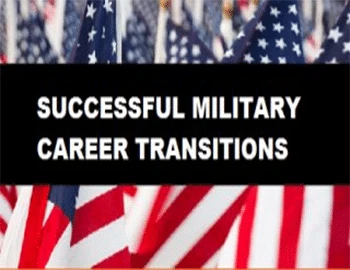
Military Transitions
Transitioning From The Military to Civilian Service? Make The Transition Successfully..
As a military veteran making the transition to civilian life you are facing a great life changing transition. You have successfully built a career within the military structure for the last number of years, gained valuable skills, experience and expertise around the world.
Now you need to translate this all into civilian jargon that the average employer will understand and recognize your value as a potential employee.
To accomplish this and set you on the right path the government offers many resources to transitioning veterans, most notability the Transition Assistant Program (TAP) which within
the first 180 of transitioning you can take advantage of a 3 day workshop that allows you to explore career roles, job search strategies, resume and cover letter preparation, etc.. These workshops are vital to a transitioning veteran as it will allow you to set the framework for your new career path. Learn what skills you have that are transferrable and how to quantify those experiences for new employment.
These government programs though only give you so much; it is up to you now to develop a strong resume, career path and achieve employment in the profession your desire.
Many employers are very interested in hiring military veterans. You have the work ethic, skills and expertise that can be transferrable to almost any industry. As a professional recruiter that has worked with numerous transitioning veterans; here are a few tips that can help set the right course;
(1) Work with a good military to civilian professional resume writer. One who understands what you did in the military and how to express and quantify your experiences into a resume that achieves your career objectives.
(2) Adjust your way of speaking for the civilian environment. It is no longer necessary to address individuals are “Sir” “Ma’am”, speak in plain language. Use civilian time references rather than military time.
(3) When discussing projects or experiences talk about the roles you played rather than the titles of the project or operations. Avoid whenever possible all military speak/jargon.
(4) Search for recruiters and job agencies that focus their efforts on Transitioning Military personnel. These recruiters have unique contacts and understand what it takes for a veteran to transition away from military service.
(5) Emphasize your skills, experience and accomplishments. Network with as many people as you can.
Additionally, talking with as many veterans as you can, learn about their experiences and how they made the transition; learning about what they are doing now may open up opportunities that could lead you to a potential job opportunity.
There are also many employers that have programs in place to hire transitioning military; Home Depot, Wal-mart, and General Electric are a few of many that actively search out military veterans. You can also search online job boards like Military.com or Monster.com for opportunities specifically focused on transitioning military.
Michael DeSafey is a leading executive recruiter for professionals in the construction, engineering and environmental industries. He is currently the President of Webuild Staffing (www.webuildstaffing.com ). To learn more about Michael or Follow his Blog please visit www.michaeldesafey.com
